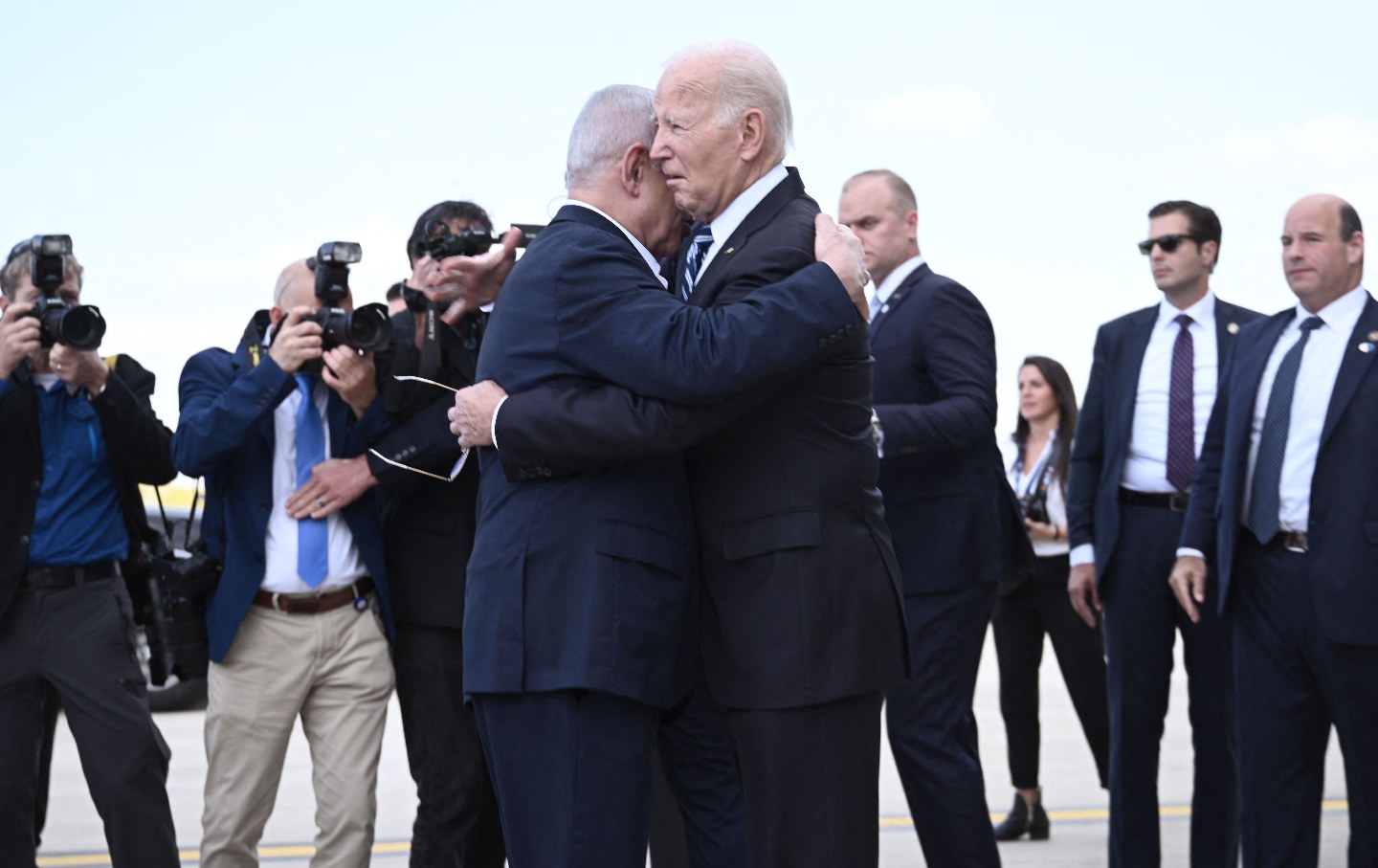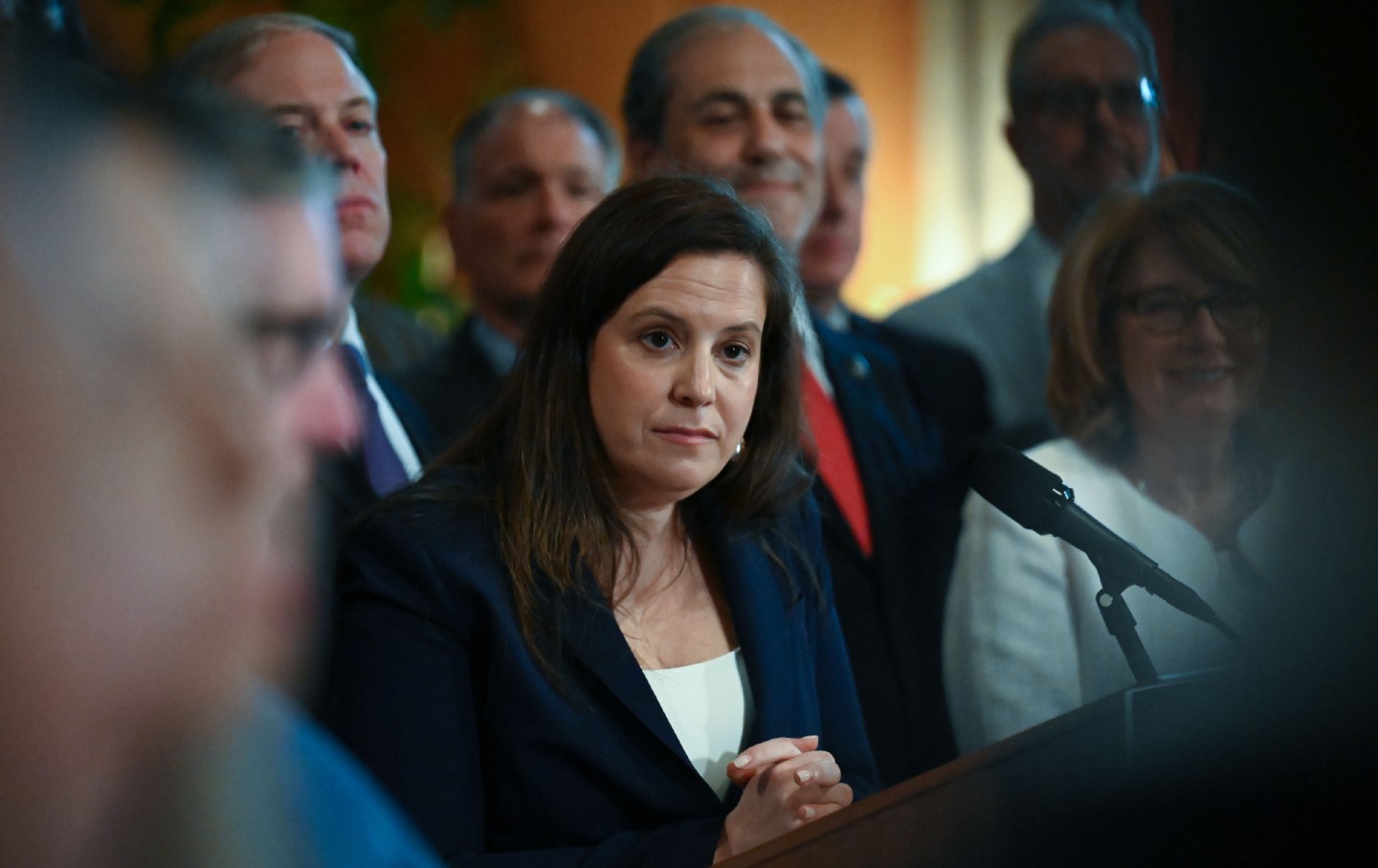The Lifelong Incoherence of Biden’s Israel Strategy
The president’s muddled policy course in the Middle East is angering voters across the political spectrum—and it could usher Trump back into the White House.

Israel Prime Minister Benjamin Netanyahu hugs US President Joe Biden upon his arrival at Tel Aviv’s Ben Gurion airport on October 18, 2023.
(Brendan Smialowski / AFP via Getty Images)
“You don’t have to be a Jew to be a Zionist,” President Joe Biden declared last December at the White House Hanukkah reception, to applause. Biden, who is not a Jew, rattled off his Zionist bona fides: When each of his children and grandchildren turned 14, he flew them to Dachau to impress upon them the horrors of the Holocaust; he called his commitment to the Jewish state “unshakable” and boasted that he had known Israeli Prime Minister Benjamin Netanyahu for 51 years. “Folks, were there no Israel, there wouldn’t be a Jew in the world who was safe,” proclaimed the man responsible for the security of roughly 7 million American Jews—to more applause.
Since Hamas’s October 7 attack, Biden has offered what he has accurately described as “unprecedented” levels of American support for Israel’s retaliatory assault on Gaza—an approach that may appease some Democratic donors but has alienated key constituencies. A CNN national poll in April showed that Biden’s handling of the war is his worst major issue, with 71 percent overall disapproval, rising to 81 percent among respondents under age 35; voters in this youngest cohort, who had favored Biden over Donald Trump by a 31-point margin in 2020, now favored Trump by 11 points. A New York Times poll in May showed Biden trailing Trump in five key states (including Michigan, with its large Arab and Muslim population), and noted that 13 percent of voters who preferred Biden in 2020 but won’t vote for him in 2024 cite Gaza as their reason, with the vast majority of those sympathizing with Palestinians over Israel. Other polls present a more ambiguous picture—many younger voters do support Israel, and many issues are seen as higher priorities—but it’s clear that the strategy Biden has chosen to navigate Israel’s war over the past eight months has not helped him politically as he heads into an election likely to be decided by close margins in a few swing states.
By this point it’s become conventional wisdom that Biden is risking his presidency over his strident support for Israel since October 7. “Gaza has become the albatross around Biden’s neck,” wrote Nicholas Kristof in an April New York Times column. “It is his war, not just Benjamin Netanyahu’s. It will be part of his legacy, an element of his obituary, a blot on his campaign.” “If nothing changes, the destruction of Palestine will be a major piece of Biden’s legacy,” wrote Jonathan Guyer in an American Prospect cover story in March. Many observers furthermore agree, as Guyer puts it, that “the reason for Joe Biden’s particular brand of Israel policy is Joe Biden”—that the president’s fervent Zionism has constrained US policy options relative to what a standard-issue Democrat, including Biden’s own advisers, might consider.
But while the narrative that Biden’s support for Israel has been stalwart over decades is broadly accurate, a closer examination of the president’s long career in public life reveals scattered moments of ambivalence. That Biden has sometimes pushed back against more hard-line Israel supporters isn’t meant as a defense; if anything, Biden’s muddled record on this issue accounts for a policy course that voters across the political spectrum find unsatisfactory. Biden’s bedrock support for the Jewish state has coexisted with an occasional willingness to criticize its leadership that comes and goes according to shifting circumstances—a pattern that has been evident with Biden’s belated, halting attempts to limit military aid even as Netanyahu invades Rafah, and with his recent efforts to promote a supposedly Israeli-backed cease-fire deal that Israel itself continues to undermine. The problem with Biden on Israel, in short, isn’t just that he’s been too supportive—it’s that he’s been incoherent. That incoherence, as much as the underlying immorality of his policy, is why the war in Gaza threatens to usher Trump back into the White House.
In 1948, when the future president was 6, his father supposedly explained to him that the newly founded state of Israel was necessary to protect the Jewish people in the wake of the Holocaust. His father, “a righteous Christian,” Biden said in 2015, in one of many retellings of this anecdote, “talked about how he could not understand why there was a debate among Americans or why there was a debate among American Jews about whether or not we should have recognized Israel.” Such debates in fact raged at the time—among American Jews, Zionism was far from a consensus position in the late 1940s, and among American foreign policy elites, there were serious concerns about antagonizing the Arab world, given its rich oil resources—but as far as Biden is concerned the issue has always been a settled one.
Biden was first sworn in as a US senator in 1973, at age 30. Always a bit of a square, he never identified with the counterculture (“I wore sports coats. You’re looking at a middle-class guy,” Biden said in 1987, explaining his disinterest in Vietnam-era protests. “I’m not big on flak jackets and tie-dyed shirts.”) His affection for Israel wasn’t forged on a kibbutz and had little to do with the left-leaning idealism that so many other members of his generation were swept up in after Israel’s victory in the 1967 Six-Day War. As Jeet Heer noted in The Nation, Biden’s views on Israel were instead shaped by one of his Senate mentors, Henry “Scoop” Jackson of Washington, a legendary Democratic hawk whose young staffers included Elliott Abrams, Paul Wolfowitz, Richard Perle, and Douglas Feith—all of whom would go on to be neoconservative architects of the 2003 US invasion of Iraq, which Biden himself would also support.
Biden eulogized Jackson in 1983, crediting him with having “changed my whole perspective on an issue that I had up to that point felt not nearly as strongly about, and that was Israel.” (That the future president credited this awakening to Jackson calls into question his oft-repeated story about learning about Israel from his father in 1948, but no one ever called Biden a reliable narrator.) Jackson, Biden said, had described visiting Buchenwald during World War II and encouraged Biden to make a series of trips to concentration camps, “which was the first time I was able to understand with any of the sense of the depth of emotion that he, like me, a non-Jew, felt about what had happened.” Jackson (often called “the senator from Boeing”) was a Cold War hawk and a champion of his state’s robust defense industry, and he saw Israel as an outpost of American power and values in a hostile region.
It was Jackson who led the charge for greater US military aid for Israel during the 1973 Yom Kippur War when, nine months into Biden’s first Senate term, Israel was caught off-guard by a joint Egyptian-Syrian sneak attack. Campaigning for US support in the wake of the attack, Israeli Prime Minister Golda Meir made the savvy choice to host a congressional delegation that included the freshman Senator Biden. As Alexander Ward explains in The Internationalists, a recent reported account of the current administration’s foreign policy, Meir described the many security threats the country faced, in what Biden has called “one of the most consequential meetings I’ve ever had in my life”—and despite Biden’s well-known propensity for exaggeration (in fact, he seems to have greatly overstated his role in the meeting and his relevance to Meir), it probably was.
Over the course of six terms spanning more than three decades, Biden was frequently one of the Senate’s most reliable supporters of Israel. In 1975, Biden signed a joint letter organized in part by Jackson urging President Gerald Ford to provide Israel with the military aid it was requesting. In 1981, he took to the New York Times op-ed page to oppose Ronald Reagan’s sale of high-tech enhancements to Saudi Arabia’s military on the grounds that “Israel’s military superiority and military-technology edge would be dangerously eroded.” Biden and his ally Senator Daniel Patrick Moynihan of New York (who maintained close ties with neoconservative intellectuals and was another of the Senate’s leading champions of the Jewish state) both told the Times that they were being subjected to antisemitic vitriol for their opposition to the Saudi arms deal. “I have a feeling that American Jews are being made a scapegoat,” Biden said. The following year, Biden was the only senator who defended Israel’s conduct in its invasion of Lebanon in a closed meeting of the Senate Foreign Relations Committee with the right-wing Israeli Prime Minister Menachem Begin, in terms that apparently shocked Begin himself; three months later, Christian militias backed by Israel carried out the massacre of hundreds if not thousands of Palestinian civilians in the Sabra and Shatila refugee camps.
On the other hand, in 1980, Biden defended the Carter administration’s decision not to veto a UN resolution condemning Israeli settlements, situating himself to the left of many of his Senate colleagues. At the time he said the Carter administration should declare publicly, “We’re mad as hell with Begin over settlements,” and added that Begin “seriously underestimates the anger of the American people over settlements.” Two years later, under the Reagan administration and amid the Lebanese invasion, Biden reportedly threatened Begin with aid cuts in response to settlement expansion, to the point where Begin responded, “Sir, do not threaten us with cutting aid. First of all, you should know that this is not a one-way street. You help us, and we are very grateful for your help, but this is a two-way street. We do a lot for you.”
Biden certainly agreed that Israel was a strategic asset to the United States. In 1984, he took the lead on getting Congress to establish that Israel would always receive enough economic assistance from the US to cover the cost of its weapons purchases, a privilege that was not extended to neighboring Egypt. In 1986, Biden told the Israeli ambassador to the US that aid for Israel was “the biggest bang for our buck” and that he felt the US should refrain from criticizing Israel publicly. At the time, the Israeli embassy regarded Biden as a minor player in Middle East policy and classified him as neither especially for nor especially against Israel. That ambivalent impression is understandable; even today, it is hard to reconcile Biden’s privately championing Israel’s brutality in Lebanon with his publicly criticizing Israel for settlement expansion, only to turn around a few years later and say Israel should only ever be criticized in private.
The Reagan era coincided with the emergence of a well-funded Israel lobby, led by the American Israel Public Affairs Committee (AIPAC), that would come to dominate American Jewish political life and to pressure politicians in both parties to stand with Israel. One politician in particular was an eager recipient: Over the course of his Senate career, Biden took $4.2 million from pro-Israel groups, more than any other senator in history. The youth director for his failed 1988 presidential campaign, Jonathan Kessler, was hired directly from AIPAC, and AIPAC lobbyists favored Biden’s campaign “because he has long been vocal in support of Israel,” as the Times reported that cycle. In 1991, when George H.W. Bush’s secretary of state, James Baker, insisted on conditioning aid to Israel on the restriction of settlement expansion, AIPAC lobbied Congress to override the Bush policy, and Biden cosponsored a bill to that effect, which failed to pass. AIPAC had not quite achieved bipartisan hegemony: “Fuck ’em, they didn’t vote for us,” Baker allegedly said in 1992 of Jewish supporters of Israel.
AIPAC money might seem to account for how Biden went from a critic of Israeli settlements to a defender over the course of about a decade. But a few years after his attempt to override Bush and Baker, in 1998, Biden took the more dovish side of an intra-Democratic debate over Bill Clinton’s attempt at a peace initiative. The hawks were represented by Senator Joe Lieberman, who coauthored an AIPAC-backed, Netanyahu-aligned letter urging Clinton not to publicly confront Israel, while Biden signed a response letter authored by Senator Carl Levin praising the administration’s efforts at diplomacy. Biden supported Clinton’s ultimately unsuccessful effort to secure a two-state solution at Camp David, and into the George W. Bush administration, he continued to call for a regional peace plan, including in a New York Times op-ed in which he wrote, “Israelis will have to understand, as most already do, that a Palestinian state will require dismantling most settlements.” He even blocked a 2002 effort by Netanyahu, then between prime ministerships, to address the Senate Foreign Relations Committee, calling it “totally inappropriate” for the opposition leader to use that forum to undermine then–Secretary of State Colin Powell’s efforts to negotiate a ceasefire.
Biden’s relative dovishness during the Clinton and George W. Bush years makes for an odd and inexplicable contrast with his relative hawkishness during Barack Obama’s administration. When Biden became vice president in 2009, he developed a reputation as the “good cop” who could personally get along with Netanyahu, unlike Obama, whose relationship with his Israeli counterpart was rocky from the start. Months into Obama’s first term, which coincided with Netanyahu’s return to power, the new president gave an address to the Arab world in Cairo in which he affirmed US support for a two-state solution, which Netanyahu reluctantly endorsed under Obama’s pressure (in January of this year, Netanyahu declared his blanket opposition to a Palestinian state). In 2010, Netanyahu insultingly timed the announcement of new settlement construction to line up with a Biden visit to Israel, prompting a furious reaction from Obama and Secretary of State Hillary Clinton, who contemplated punishing Netanyahu for his intransigence. But then Biden called Netanyahu to reassure him it would all blow over, thereby undercutting the credibility of his own administration’s threat, to Obama and Clinton’s further consternation. As reported by The New York Times, that same year Biden told Uzi Arad, one of Netanyahu’s top advisers, “Just remember that I am your best fucking friend here.”
Popular
“swipe left below to view more authors”Swipe →In short, it isn’t quite right to say that Biden has always taken the most hawkish possible stance on Israel. As a senator and as vice president, he was consistently a staunch Zionist, a leading beneficiary of AIPAC funds, and a champion of Israel’s right to defend itself. But there have been times when he voiced opposition to settlements and tried to support peace negotiations while other Senate Democrats took a harder line, and there have also been times when he undermined efforts by presidents in both parties to put meaningful pressure on Israel. It’s a maddening record, and it foreshadowed a maddening presidency.
From the start of his term, Biden has been deferential to Israel. The Trump administration’s significant rightward Middle East policy shifts have all been maintained by Biden, despite some half-hearted efforts to resuscitate the Obama administration’s Iran nuclear deal. For Biden’s first few years in office, there were no significant efforts to revive the long-moribund peace process between Israel and the Palestinian Authority; a short Israel-Hamas war in May 2021 caught the administration off-guard and was resolved inconclusively with little impact on US policy. In an article drafted for Foreign Affairs just before the October 7 attacks, Biden’s national security adviser, Jake Sullivan, wrote that the Middle East “is quieter than it has been for decades,” adding that “we have de-escalated crises in Gaza.” That unfortunately timed passage made it to print, though it was wiped from online publication, but it reflected the administration’s basic attitude before the attacks. The Palestinian issue was seen as contained, manageable, and unlikely to derail Biden’s agenda. A year out from reelection, Biden was blindsided by Hamas and unprepared for the political consequences of embracing Israel’s war on Gaza.
Just over a week after the attacks, Biden traveled to Israel to meet with Netanyahu and to express solidarity with a traumatized ally. “The fact that the most powerful person on Earth—the president of the United States—is standing behind us is a big deal,” a Netanyahu adviser told NBC News at the time. The Biden administration chose to unequivocally back Israel, including with a $15 billion military assistance package that Congress passed in April and that includes no conditions on how Israel uses US-made armaments, despite knowing that Netanyahu’s reigning far-right coalition was likely to employ indiscriminate tactics against the Palestinians in Gaza. Netanyahu—who has weathered protests against his personal corruption and his attempted dismantling of Israel’s independent judiciary since well before October 7—has been strongly incentivized to extend the war as a means of staying in power and avoiding accountability for his failures in allowing the attacks to happen. The White House had every reason to understand that neither Israel’s interests nor Netanyahu’s are aligned with Biden’s—and yet it decided to stake Biden’s legacy on Netanyahu’s prosecution of this war.
Maintaining this posture has compelled Biden to do things like repeat unsubstantiated claims that Hamas beheaded Israeli civilians and publicly question the accuracy of Palestinian casualty counts, as he did in late October. A day later, he apologized in private and pledged to work harder at humanizing Palestinians in his rhetoric to a small group that included several Muslim advocates, in a meeting which wasn’t reported on for another month. Biden’s quiet, perfunctory gestures of empathy have been drowned out by administration decisions like bypassing Congress to expedite a weapons sale to Israel, or vetoing a near-unanimous UN resolution condemning Israel’s war conduct in December and another supporting full UN membership for Palestine in April.
Biden’s Israel strategy since the attacks has been described by the Israeli newspaper Yediot Aharonot as a “bear hug.” In other words, by publicly demonstrating unequivocal support and affection for Israel, the US could privately curb Israel’s worst excesses—or so the theory went. For a few months, defenders of the administration could argue that the bear hug was working insofar as it prevented a wider regional war; by January, however, that seemed harder to maintain, as the war expanded to encompass US air strikes on the Houthis in Yemen, as well as ongoing exchanges between the US and Israel on the one hand and Iranian proxies on the other in multiple countries.
In late January, following the deaths of three US troops in a drone strike on Jordan, Secretary of State Antony Blinken told reporters that “we have not seen a situation as dangerous as the one we’re facing now across the region since at least 1973, and arguably even before that.” And in April, tensions between Israel and Iran reached a boiling point after Israel assassinated an Iranian general in Syria and Iran responded with drone strikes on Israeli territory; Biden ultimately held the line against further escalation. But even if the war were contained entirely within Gaza, it’s hard to describe a policy that directly implicates the White House in tens of thousands of civilian deaths as a success.
The White House has sidelined considerable dissent within the State Department, relying instead on a tight circle of hawks led by Brett McGurk, a holdover from previous administrations, including Trump’s. Since the start of the Biden presidency, McGurk’s singular priority has been normalizing relations between Israel and Saudi Arabia; he regarded Palestinians as irrelevant before October 7 and since then has seen them as expendable. In January, Akbar Shahid Ahmed, a diplomatic correspondent for HuffPost, exposed McGurk’s secret plan to expedite Saudi-Israeli normalization and to offer a Saudi-funded reconstruction of Gaza as leverage to impose a new Israel-friendly government over the Palestinians in Gaza and the West Bank. The White House was so embarrassed that it accused Ahmed of making up quotes by senior US officials—a serious and unsubstantiated charge.
Still, as the casualties in Gaza mounted, the administration seemingly attempted to distance itself from Netanyahu through a steady series of anonymous leaks and occasional half-hearted public statements indicating that Biden and various senior officials had repeatedly attempted to rein in Israel. A December 28 Axios scoop, for instance, describes a “frustrating” phone call between Biden and Netanyahu; per one unnamed US official, “The feeling was that the president is going out on a limb for Bibi every day and when Bibi needs to give something back and take some political risk he is unwilling to do it.” The same basic narrative was playing out almost six months later; a New York Times report in May documents a seemingly never-ending series of White House “frustrations.” The administration clearly wants the public to be aware of Biden’s annoyance with Netanyahu, but for months it failed to hold Netanyahu meaningfully accountable, even as it made some criminally insufficient gestures toward alleviating what the US Agency for International Development warned could be a famine “unprecedented in modern history” and what Cindy McCain, whom Biden appointed as head of the World Food Program, called “a full-blown famine” in northern Gaza in early May.
After seven months of this dance, Biden finally took what seemed to be a significant public step toward holding Netanyahu accountable. He paused a shipment of bombs to Israel in protest of Netanyahu’s decision to proceed with an invasion of Rafah, the enclave in southern Gaza on the Egyptian border where hundreds of thousands of Palestinians have fled from the devastated north. Neither the United States nor its allies in Cairo want to see a Palestinian refugee crisis spill over the heavily fortified border with Egypt, and Netanyahu’s repeated intransigence seemingly pushed Biden over the edge. “Civilians have been killed in Gaza as a consequence of those bombs,” Biden told CNN on May 8, marking his first public acknowledgment of US culpability in Palestinian civilian deaths. “I made it clear that if they go into Rafah—they haven’t gone in Rafah yet—if they go into Rafah, I’m not supplying the weapons that have been used historically to deal with Rafah, to deal with the cities—that deal with that problem,” the president added.
But in fact Israel had begun firing on Rafah, and a week later the assault showed no signs of slowing down, as Biden announced another $1 billion arms sale to the Jewish state, confounding many of his supporters. Israel already has sufficient arms to carry out its invasion; Biden’s weapons pause was a warning shot, but he undercut it almost immediately. As long as Palestinians are still being killed, it’s unlikely that he’ll bank any goodwill with the left, but he has managed to alienate centrist and center-right voices that support Israel, as columns by Mark Penn, Bret Stephens, and others show. “We are deeply alarmed by indications of US delays and possible curtailment of weapons for Israel,” tweeted the Anti-Defamation League in the wake of the pause. “This move undermines our ally Israel, fails to put pressure on Hamas and emboldens terror while energizing Hezbollah and Iran, who specialize in toxic antisemitism and rabid anti-Zionism.”
On May 31, Biden declared in his strongest language to date that it was “time for this war to end,” claiming that Israel had fully degraded Hamas’s capacity to carry out future attacks and that Israel itself had advanced an actionable cease-fire plan. The president urged Israel to follow through on that plan and suggested that he would not back an indefinite Israeli occupation of Gaza. Three weeks later, however, the war was still ongoing amid denials from Israeli officials that Israel had in fact proposed the cease-fire deal Biden described; in a daytime raid that successfully rescued four Israeli hostages, Israel killed a reported 274 Palestinians in the Nuseirat refugee camp. Meanwhile, as Israeli politicians maneuver ahead of possible new elections, the leaders of both parties in Washington are preparing to reward Netanyahu next month with an appearance before a joint session of Congress, where the Israeli prime minister will have the opportunity to pose as a triumphant statesman who defeated Hamas while preserving American military and diplomatic support. In early June, Blinken met with Netanyahu and reportedly pledged to roll back the previous month’s limitations on arms shipments, which Netanyahu argued had strengthened Iran’s strategic position. Just yesterday, on the same day The Washington Post reported that the Biden administration strong-armed Democratic lawmakers into voting for a major arms sale to Israel, despite reservations from some that the weapons would be used against civilians, Netanyahu brazenly attacked Biden and Blinken for supposedly withholding weapons and ammunition.
Clearly, Netanyahu feels free to ignore the White House’s warnings and keep doing what he’s doing, confident that the only consequence he’ll face is negative press. To Democratic voters opposed to the war, Biden not only looks complicit; he looks weak—and no doubt that suits Netanyahu just fine. In backing Israel for months before belatedly and inadequately pressuring it, Biden has managed to please no one. It’s a policy in keeping with his long history of supporting the Jewish state while occasionally criticizing it—and during the more than 50 years Biden has maintained that posture, Israel’s political center has drifted steadily further to the right, settlements have expanded, and the prospect of peace has become ever more elusive.
If Biden were merely a committed hawk, he might have managed this crisis with a discernible strategy—though not necessarily one that would have pleased left-wing critics of Israel. He might, for instance, have provided even more full-throated support to Netanyahu’s government, without the constant professions of “frustration”; alternatively, he might have thrown US support fully behind Israel’s centrist opposition, which is no less committed than Netanyahu to total war with Hamas, and attempted to box Netanyahu out. Or he might have even modeled himself after a traditional realist like James Baker—who was no peacenik but rather a champion of cold-blooded realpolitik on behalf of what he saw as the American national interest—and taken a much tougher line on military aid to Israel, asserting US prerogatives as a global superpower.
But Biden has done none of these things. Since October 7, he has drawn red lines he has no intention of enforcing and allowed Netanyahu to repeatedly humiliate him and get away with it, strengthening the Israeli prime minister both with his domestic constituency and with the American right, which may very well regain control of US foreign policy as a result. Morally, strategically, politically—from any perspective, Biden’s Middle East policy has been a dismal mess. It’s as if he has taken half a century of incoherence on Israel and compressed it into what may turn out to be a single presidential term.
Disobey authoritarians, support The Nation
Over the past year you’ve read Nation writers like Elie Mystal, Kaveh Akbar, John Nichols, Joan Walsh, Bryce Covert, Dave Zirin, Jeet Heer, Michael T. Klare, Katha Pollitt, Amy Littlefield, Gregg Gonsalves, and Sasha Abramsky take on the Trump family’s corruption, set the record straight about Robert F. Kennedy Jr.’s catastrophic Make America Healthy Again movement, survey the fallout and human cost of the DOGE wrecking ball, anticipate the Supreme Court’s dangerous antidemocratic rulings, and amplify successful tactics of resistance on the streets and in Congress.
We publish these stories because when members of our communities are being abducted, household debt is climbing, and AI data centers are causing water and electricity shortages, we have a duty as journalists to do all we can to inform the public.
In 2026, our aim is to do more than ever before—but we need your support to make that happen.
Through December 31, a generous donor will match all donations up to $75,000. That means that your contribution will be doubled, dollar for dollar. If we hit the full match, we’ll be starting 2026 with $150,000 to invest in the stories that impact real people’s lives—the kinds of stories that billionaire-owned, corporate-backed outlets aren’t covering.
With your support, our team will publish major stories that the president and his allies won’t want you to read. We’ll cover the emerging military-tech industrial complex and matters of war, peace, and surveillance, as well as the affordability crisis, hunger, housing, healthcare, the environment, attacks on reproductive rights, and much more. At the same time, we’ll imagine alternatives to Trumpian rule and uplift efforts to create a better world, here and now.
While your gift has twice the impact, I’m asking you to support The Nation with a donation today. You’ll empower the journalists, editors, and fact-checkers best equipped to hold this authoritarian administration to account.
I hope you won’t miss this moment—donate to The Nation today.
Onward,
Katrina vanden Heuvel
Editor and publisher, The Nation
More from The Nation

Islamophobic Elites Lied to Destroy the Life of a Palestinian Brown Student Islamophobic Elites Lied to Destroy the Life of a Palestinian Brown Student
Plutocrats, pundits, and government officials joined together in a racist smear campaign against a queer Palestinian student at Brown University.

Recent Democratic Victories Have Republicans Running Scared Recent Democratic Victories Have Republicans Running Scared
Elise Stefanik is just the latest top Republican deciding against running in the 2026 midterms.

Pirate Trump Pirate Trump
Donald Trump escalates Caribbean tensions with vessel attacks near Venezuela.

Trump’s “Warrior Dividend” Might Be His Scariest Idea Yet Trump’s “Warrior Dividend” Might Be His Scariest Idea Yet
This week’s “Elie v. US” explores the authoritarian threat beneath Trump’s bonuses for military families. Plus, a case for getting rid of the Second Amendment.




